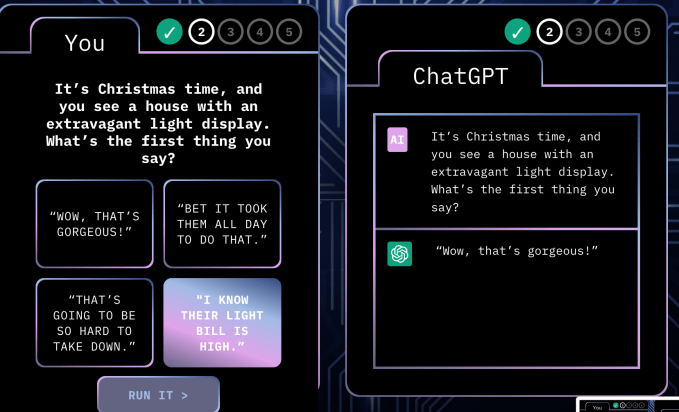Creative ad agency McKinney developed a quiz game called “Are You Blacker than ChatGPT?” to shine a light on AI bias.
The game tests a person’s knowledge of Black culture against what ChatGPT has been trained to know about the Black community. It asks questions like, “What does it mean when someone says, ‘Not too much on them, now?’” and “What is your response if you are invited to an event?” When I took the quiz, both ChatGPT and I got the first one right — when someone says “not too much on them,” that usually means to go easy on them. But ChatGPT failed when it came to the second one. When someone invites you to an event, the stereotypical response in the Black community is, “Who else is going to be there?” But ChatGPT said it was, “Thanks for the invite!”
“It’s interesting because it’s billed as this bot that knows everything, and it’s like, clearly, you don’t know everything, especially when it comes to things that aren’t white-specific,” Meghan Woods, a copywriter at McKinney and one of the game’s creators, told TechCrunch.
Woods said the idea for the quiz came last year during a creative brainstorm at McKinney. It took a year for Woods and a Black-led team to create this product, with the purpose of playfully pointing out how out-of-touch ChatGPT is with Black users. She pointed out that a blind spot for ChatGPT seems to stem from the fact that a lot of Black cultural elements are not necessarily documented online; they are, instead, passed down in-person or orally through generations. This means its algorithm misses a lot of nuances when scraping the internet for information about Black people.
“The blind spots can be pretty upsetting,” Woods said. “It’s pretty dangerous.”

An example of ChatGPT getting an answer wrong about something stereotypically common in the Black community.
AI might be on a hot streak, but women, Black and brown builders, and founders in the space have long spoken of being ignored or pushed aside. The result is that AI innovation is being built without the cultural insight and complexities that would make it suitable for different cultures. At its most extreme, the dearth of diversity means cars are developed using AI that cannot detect Black skin, leading to an increasing number of accidents. On the other end, it simply means a chatbox that can’t distinguish between one Whitney Houston song and another.
Gerald Carter, founder of Destined AI, a company that helps detect and mitigate AI bias, said the McKinney quiz does a good job at gamifying and bringing more awareness to these AI gaps. “A lot of nuances can be addressed by including diverse perspectives at every level,” he said. “For AI to reach its full potential, it needs to work for everyone, everywhere.”
ChatGPT’s parent company, OpenAI, has received criticism for the lack of diversity on its board. Woods said it doesn’t seem like ChatGPT is learning from the quiz, either, based on the fact that it keeps getting the same answers wrong in many cases. “Our hypothesis is that it will never be able to fully grasp a lot of the things we ask it.”
We reached out to OpenAI for comment and will update this post when we hear back.
Carter said that ChatGPT could work better for more cultures with better sourcing and having more inclusive data collection. A more immediate approach is monitoring AI model drift and making improvements using tools focused on cultural perspectives.
While larger companies work on making AI useful for everyone, Black and brown builders in the space have taken matters into their own hands to ensure this next wave of AI is diverse.
Carter, for example, works with companies to help them source more inclusive data. Erin Reddick created ChatBlackGPT (no relation to OpenAI) to offer deeper insights into Black culture and history, and Tamar Huggins raised $1.4 million for her ChatGPT alternative, called Spark Plug, which translates classic literature texts into the African American Vernacular English (AAVE) dialect.
“Hiring, retention, making sure that people are in the room at the table,” Woods said, regarding what more needs to be done to make AI more inclusive. “I know it sounds cliché, but I do think that can start to have an impact.”



![[CITYPNG.COM]White Google Play PlayStore Logo – 1500×1500](https://startupnews.fyi/wp-content/uploads/2025/08/CITYPNG.COMWhite-Google-Play-PlayStore-Logo-1500x1500-1-630x630.png)